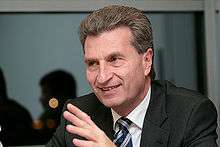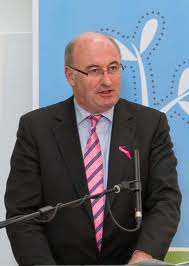European People's Party
European People's Party | |
|---|---|
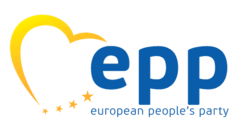 | |
| Leader | Jean-Claude Juncker (LU) |
| President | Joseph Daul MEP (FR) |
| Deputy leader | Jyrki Katainen (FI) |
| Founded | 8 July 1976 |
| Headquarters | Rue du Commerce/Handelsstraat 10, 1000 Brussels, Belgium |
| Think tank | Wilfried Martens Centre for European Studies |
| Student wing | European Democrat Students |
| Youth wing | Youth of the European People's Party |
| Women's wing | Women of the European People's Party |
| Ideology |
Liberal conservatism[1] Christian democracy[1] Pro-Europeanism European federalism |
| Political position | Centre-right |
| International affiliation |
Centrist Democrat International, International Democrat Union |
| European Parliament group | European People's Party |
| Colours | Blue |
| European Parliament |
216 / 751 |
| European Council |
8 / 28 |
| Website | |
|
www | |
The European People's Party (EPP) is a European political party. A transnational organisation, it is composed of other political parties, not individuals. Founded by Christian democratic parties in 1976, it has since broadened its membership to include liberal-conservative parties and parties with other centre-right political perspectives.[2][3][4][5]
The EPP has been the largest party in the European Parliament since 1999 and in the European Council since 2002. It is also by far the largest party in the current European Commission. The President of the European Council and the President of the European Commission are both from the EPP. Many of the Founding fathers of the European Union were also from parties that later formed the EPP. Outside the EU the party also controls a majority in the Parliamentary Assembly of the Council of Europe. The EPP has alternated with its centre-left rival the Party of European Socialists (PES) as the largest European political party and parliamentary group.
The EPP includes major parties such as the Christian Democratic Union of Germany (CDU), The Republicans (LR) of France, Fine Gael of Ireland, and the People's Party (PP) of Spain, and it has member parties in all of the EU member states except the United Kingdom.
History
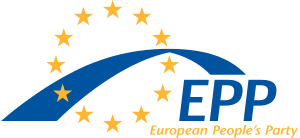
According to its website, the EPP is "the family of the political centre-right, whose roots run deep in the history and civilisation of the European continent, and [which] has pioneered the European project from its inception".[6]
The EPP was founded in Luxembourg on 8 July 1976 on the initiative of Jean Seitlinger; Leo Tindemans, then Prime Minister of Belgium, who became the first President of the EPP; and Wilfried Martens, who later became both President of the EPP and Prime Minister of Belgium. It had been preceded by the Secretariat International des partis démocratiques d'inspiration chrétienne, founded in 1925,[7] the Nouvelles Equipes Internationales, founded in 1946[8] (or 1948),[7] and the European Union of Christian Democrats, founded in 1965.[8]
In the late 1990s the Finnish politician Sauli Niinistö negotiated the merger of the European Democrat Union (EDU), of which he was President, into the EPP. In October 2002 the EDU ceased its activities after being formally absorbed by the EPP at a special event in Estoril, Portugal. In recognition of his efforts Niinistö was elected Honorary President of the EPP the same year.
The EPP has had five Presidents:
| No. | Image | Name | Tenure | Member state |
|---|---|---|---|---|
| 1 | .jpg) |
Leo Tindemans | 1976–1985 | |
| 2 | _Piet_Bukman_(CPTB)_-_NL-HaNA_Anefo_930-6917_WM357.jpg) |
Piet Bukman | 1985–1987 | |
| 3 |  |
Jacques Santer | 1987–1990 | |
| 4 | 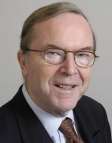 |
Wilfried Martens | 1990–2013 | |
| 5 | 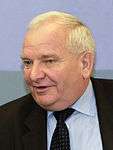 |
Joseph Daul | 2013–present | |
Platform and manifesto
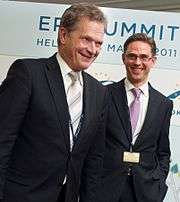
Political manifesto and platform
During its Congress in Bucharest in 2012 the EPP updated its political platform after 20 years (since its Congress in Athens in 1992) and approved a political manifesto in which it summarised its main values and policies.[9]
The manifesto highlights:
- Freedom as a central human right, coupled with responsibility
- Respect for traditions and associations
- Solidarity to help those in need, who in turn should also make an effort to improve their situation
- Ensuring solid public finances
- Preserving a healthy environment
- Subsidiarity
- Pluralist democracy and a Social Market Economy
The manifesto also describes the EPP's priorities for the EU, including:
- European Political Union
- Direct election of the President of the European Commission
- Completion of the European Single Market
- Promotion of the family, improvements in education and health
- Strengthening of the common immigration and asylum policy, and integrating immigrants
- Continuation of enlargement of the EU, enhancement of the European Neighbourhood Policy and special relationship frameworks for countries that cannot, or do not want to, join the EU
- Defining a true common EU energy policy
- Strengthening European political parties
Electoral manifesto
As a central part of its campaign for the European elections in 2009 the EPP approved its election manifesto at its Congress in Warsaw in April that year. The manifesto called for:
- Creation of new jobs, continuing reforms and investment in education, lifelong learning, and employment in order to create opportunities for everyone.[10]
- Avoidance of protectionism, and coordination of fiscal and monetary policies.[10]
- Increased transparency and surveillance in financial markets.[10]
- Making Europe the market leader in green technology.[10]
- Increasing the share of renewable energy to at least 20 per cent of the energy mix by 2020.;.[10]
- Family-friendly flexibility for working parents, better child care and housing, family-friendly fiscal policies, encouragement of parental leave.[10]
- A new strategy to attract skilled workers from the rest of the world to make Europe’s economy more competitive, more dynamic and more knowledge-driven.[10]
.jpg)
Governance
The EPP operates as an international non-profit association under Belgian law according to its by-laws, the Statutes of the European People's Party (Statuts du Parti Populaire Européen), originally adopted 29 April 1976.[11]
Presidency
The Presidency is the executive body of the party. It decides on the general political guidelines of the EPP and presides over its Political Assembly. The Presidency is composed of the President, ten Vice-Presidents, the Honorary Presidents, the Secretary General and the Treasurer. The Chairperson of the EPP Group in the European Parliament, the Presidents of the Commission, the Parliament and the Council, and the High Representative (if they are a member of an EPP member party) are all ex officio Vice-Presidents.
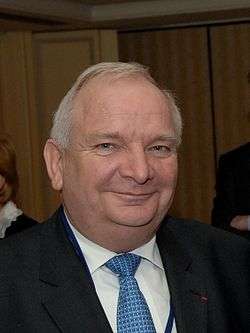
As of 2015 the Presidency[12] of the EPP comprised:
- Joseph Daul – President
- Antonio Lopez-Isturiz White – Secretary General
- Christian Schmidt – Treasurer
- David McAllister – Vice-President
- Johannes Hahn – Vice-President
- Jyrki Katainen - Vice-President
- Antonio Tajani – Vice-President
- Marianne Thyssen– Vice-President
- Jacek Saryusz-Wolski – Vice-President
- Kinga Gál – Vice-President
- Dara Murphy – Vice-President
- Paulo Rangel – Vice-President
- Corien Wortmann-Kool – Vice-President
- Jean-Claude Juncker – Ex officio Vice-President (President of European Commission)
- Donald Tusk – Ex officio Vice-President (President of the European Council)
- Manfred Weber – Ex officio Vice-President (Chairperson of the EPP Group in European Parliament)
- Sauli Niinistö - Honorary President
Political Assembly
The Political Assembly defines the political positions of the EPP between Congresses, and decides on membership applications, political guidelines and the budget. The Political Assembly is composed of designated delegates from EPP member parties, associated parties, member associations and other affiliated groups. The Political Assembly meets at least three times a year.
Congress
The Congress is the highest decision-making body of the EPP. It is composed of delegates from member parties, EPP associations, EPP Group MEPs, the EPP Presidency, national heads of party and government, and European Commissioners who belong to a member party, with the numbers of delegates being weighted according to the EPP's share of MEPs, and individual delegates being elected by member parties according to member parties' rules.[13]
Under the EPP's statutes the Congress must meet once every three years, but it also meets normally during the years of elections for the European Parliament (every five years), and extraordinary Congresses have also been summoned. The Congress elects the EPP Presidency every three years, decides on the main policy documents and electoral programmes, and provides a platform for the EPP's heads of government and party leaders.
Activities within the party
Summit
EPP leaders meet for the EPP Summit a few hours before each meeting of the European Council in order to formulate common positions. Invitations are sent by the EPP President and attendees include, besides the members of the EPP's Presidency, all Presidents and Prime Ministers who are members of the European Council and belong to the EPP; the Presidents of the European Parliament, the European Commission and the European Council, as well as the High Representative for Foreign Affairs, provided that they belong to the EPP; Deputy Prime Ministers or other ministers in those cases where the Prime Minister of a country does not belong to an EPP member party; and, where no EPP member party is part of a government, the leaders of the main EPP opposition party.
.jpg)
Ministerial meetings
Following the pattern of the EPP Summit the party also organises regular EPP Ministerial meetings before each meeting of the Council of the European Union, with ministers, deputy ministers, secretaries of state and MEPs in the specific policy field attending:
- General Affairs
- Foreign Affairs
- Economy and Finance
- Home Affairs
- Justice
- Defence
- Employment and Social Affairs
- Industry
- Agriculture
- Energy
- Environment[14]
Other activities
The EPP also organises working groups on different issues and on an ad hoc basis, as well as meetings with its affiliated members in the European Commission. It also invites individual Commissioners to the EPP Summit meetings and to EPP Ministerial meetings.
Following amendments to the EU Regulation that governs Europarties in 2007, the EPP, like the other "Europarties", is responsible for organising a pan-European campaign for the European elections every five years. According to the Lisbon Treaty, the parties must present candidates for President of the European Commission, but the EPP had already done this by endorsing Jose Manuel Barroso for a second term in April 2009.
The year 2014 saw the first fully fledged campaign of the EPP ahead of the European elections of that year. The party nominated former Luxembourgish Prime Minister Jean-Claude Juncker as its candidate for President of the European Commission and led a pan-European campaign in coordination with the national campaigns of all its member parties.
Activities within European institutions
The EPP holds the Presidencies of two of the three main EU institutions: the European Commission, led by President Jean-Claude Juncker (CSV), and the European Council, led by Donald Tusk (PO), who has been nominated by the EPP and took office the 1st of December 2014.
Overview of the European institutions
| Organisation | Institution | Number of seats |
|---|---|---|
| | European Parliament | 215 / 751 |
| | Committee of the Regions | 125 / 344 |
| | European Commission | 14 / 28 |
| | European Council (Heads of Government) | 8 / 28 |
European Commission
In 2014 the EPP nominated Jean-Claude Juncker as its candidate for election as Commission President if it won the elections for the European Parliament that year. Because the EPP won Jean-Claude Juncker's nomination was endorsed by the European Council and he was elected by an absolute majority in the European Parliament.
On 1 November 2014 Jean-Claude Juncker Commission officially took office. Juncker's Commission includes 14 EPP Commissioners out of 28.
European Parliament
The EPP has the largest group in the European Parliament: the EPP Group. As of 2015 it has 216 Members of the European Parliament and its chairman is the German MEP Manfred Weber.
In every election for the European Parliament candidates elected on lists of member parties of the EPP are obliged to join the EPP Group in the European Parliament.
The EPP Group holds six of the fourteen vice-presidencies of the European Parliament.
European Council
The EPP has 8 out of the 28 heads of state or government attending the EPP summits in preparation for the European Council:
| Member state | Representative | Title | Political party | Member of the Council since | Photo |
|---|---|---|---|---|---|
| Anastasiades, NicosNicos Anastasiades | President | DISY | 28 February 2013 |  | |
| Borissov, BoykoBoyko Borissov | Prime Minister | GERB | 7 November 2014 | 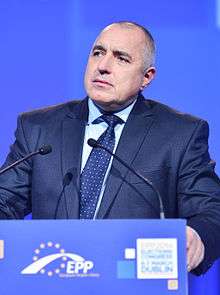 | |
| Merkel, AngelaAngela Merkel | Chancellor | CDU | 22 November 2005 | 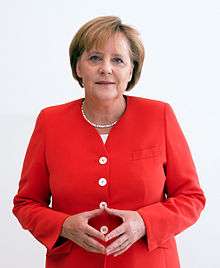 | |
| Orbán, ViktorViktor Orbán | Minister-President | Fidesz | 29 May 2010 | 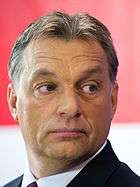 | |
| Kenny, EndaEnda Kenny | Taoiseach[a 1] | Fine Gael | 9 March 2011 | 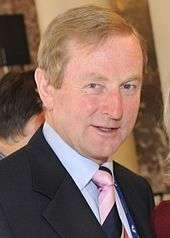 | |
| Iohannis, KlausKlaus Iohannis | President | PNL | 21 December 2014 | ||
| Rajoy, MarianoMariano Rajoy | Prime Minister of Spain | PP | 21 December 2011 | .jpg) |
The EPP also has other heads of state or government who do not normally take part in the European Council or EPP summits since that responsibility belongs to the other leaders of their countries: Rosen Plevneliev (Bulgaria, GERB), János Áder (Hungary, Fidesz), Bronisław Komorowski (Poland, PO), Aníbal Cavaco Silva (Portugal, PSD), Sauli Niinistö (Finland, KOK).
National legislatures
| Country | Institution | Number of seats |
|---|---|---|
| |
National Council Lower house |
51 / 183 |
| Federal Council Upper house |
28 / 62 | |
| |
Chamber of Representatives Lower house |
27 / 150 |
| Senate Upper house |
12 / 60 | |
| |
National Assembly | 97 / 240 |
| |
Sabor | 66 / 151 |
| |
House of Representatives | 20 / 56 |
| |
Chamber of Deputies Lower house |
39 / 200 |
| Senate Upper house |
17 / 81 | |
| |
The Folketing | 8 / 179 |
| |
Riigikogu | 14 / 101 |
| |
Parliament | 44 / 200 |
| |
National Assembly Lower house |
194 / 577 |
| Senate Upper house |
132 / 348 | |
| |
Bundestag | 311 / 630 |
| |
Parliament | 75 / 300 |
| |
Országgyűlés | 133 / 199 |
| |
Dáil Lower house |
50 / 166 |
| Seanad Upper house |
13 / 60 | |
| |
Chamber of Deputies Lower house |
106 / 630 |
| Senate Upper house |
104 / 315 | |
| |
Saeima | 23 / 100 |
| |
Seimas | 33 / 141 |
| |
Chamber of Deputies | 23 / 60 |
| |
House of Representatives | 30 / 69 |
| |
House of Representatives Lower house |
13 / 150 |
| Senate Upper house |
11 / 75 | |
| |
Sejm Lower house |
154 / 460 |
| Senate Upper house |
35 / 100 | |
| |
Assembly of the Republic | 107 / 230 |
| |
Chamber of Deputies Lower house |
134 / 412 |
| Senate Upper house |
74 / 176 | |
| |
National Council | 35 / 150 |
| |
National Assembly | 36 / 90 |
| |
Congress of Deputies Lower house |
123 / 350 |
| Senate Upper house |
124 / 266 | |
| |
Parliament | 100 / 349 |
| House of Commons Lower house | 0 / 650 | |
| House of Lords Upper house | 0 / 793 |
Activities beyond the European Union
In third countries
Through its associate and observer parties the EPP has four heads of state or government in non-EU countries, as well as one of the three members of the Bosnian Presidency, all of whom are invited to attend EPP summits and meetings:
| State | Representatives | Title | Political party | In power since | Photo |
|---|---|---|---|---|---|
| Sargsyan, SerzhSerzh Sargsyan | President | HHK | 9 April 2008 | 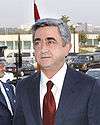 | |
| Izetbegović, BakirBakir Izetbegović Ivanić, MladenMladen Ivanić Čović, DraganDragan Čović |
Bosniak Member of the Presidency Serb Member of the Presidency Croat Member of the Presidency |
SDA PDP HDZ BiH |
10 November 2010 17 November 2014 17 November 2014 |
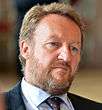 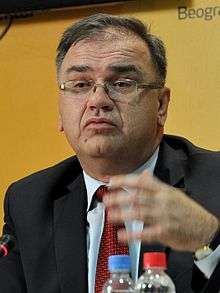 | |
| Dimitriev, EmilEmil Dimitriev | Prime Minister | VMRO-DPMNE | 18 January 2016 | ||
| Solberg, ErnaErna Solberg | Prime Minister | Høyre | 16 October 2013 | 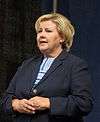 |
The EPP also has other heads of state or government who do not normally attend the meetings, since the other leaders of their countries attend instead. They include Prime Minister Vjekoslav Bevanda (Bosnia-Herzegovina, HDZ BiH), President Gjorge Ivanov (Former Yugoslav Republic of Macedonia, VMRO-DPMNE) and President Bujar Nishani (Albania, PD).
In the Council of Europe
The Group of the EPP in the Parliamentary Assembly of the Council of Europe defends freedom of expression and information, as well as freedom of movement of ideas and religious tolerance. It promotes the principle of subsidiarity and local autonomy, as well as the defence of national, social and other minorities. The EPP/CD Group is led by Pedro Agramunt, a member of the Spanish Popular Party.
The EPP/CD group also includes members from parties that are not related to the EPP itself, including members of the Patriotic Union (Liechtenstein), the Progressive Citizens' Party (Liechtenstein), the National and Democratic Union (Monaco) and the Serbian Progressive Party.[15]
In the Organization for Security and Co-operation in Europe
The "EPP and like-minded Group" in the Parliamentary Assembly of the Organization for Security and Co-operation in Europe (OSCE) is the most active political group in that body. The Group meets on a regular basis and promotes the EPP's positions. The members of the EPP Group also participate in the election-monitoring missions of the OSCE.
The Group is chaired by Walburga Habsburg Douglas (Sweden), and its Vice-Presidents are Consiglio Di Nino (Canada), Vilija Aleknaitė Abramikiene (Lithuania), Laura Allegrini (Italy) and George Tsereteli (Georgia).
The Group also includes members of parties not related to the EPP, accounting for the "like-minded" part of its name. Among them are members of the Patriotic Union (Liechtenstein), the Union for the Principality (Monaco), the Conservative Party of the United Kingdom, the Conservative Party of Canada and the Republican Party of the United States.
In the North Atlantic Treaty Organization
The EPP is also present and active in the Parliamentary Assembly of the North Atlantic Treaty Organization (NATO), and forms the “EPP and Associated Members” Group there. It is led by the German CDU politician Karl Lamers, who is also the current President of the Assembly. The Group also includes members of the Conservative Party of Canada and the Republican Party of the United States.
.jpg)
Relations with the United States
The EPP has close relations with the International Republican Institute (IRI), an organisation funded by the U.S. government specially to promote democracy and democratisation. The EPP and the IRI cooperate within the framework of the European Partnership Initiative.[16]
The EPP's President, Wilfried Martens, endorsed Senator John McCain, the Republican nominee for president, in the presidential election in 2008[17] McCain is also Chairman of the IRI. In 2011 Martens and McCain made joint press statements expressing their concern about the state of democracy in Ukraine.[18][19]
Global networks
The EPP is a member of two global centre-right organisations, the International Democrat Union (IDU) and the Christian Democrat International (CDI).
Wilfried Martens Centre for European Studies
Following the revision in 2007 of the EU Regulation that governs European political parties, allowing the creation of European foundations affiliated to Europarties, the EPP established in the same year its official foundation/think tank, the Centre for European Studies (CES). The CES includes as members all the major national think tanks and foundations affiliated to EPP member parties: the Konrad Adenauer Foundation (CDU), the Hanns Seidel Foundation (CSU), the Foundation for Analysis and Social Studies (PP), the Constantinos Karamanlis Institute for Democracy (ND), the Jarl Hjalmarson Foundation (MOD), the Political Academy of the Austrian People's Party (ÖVP) and others. During the European Parliament election campaign in 2009 the CES launched a web-based campaign module, tellbarroso.eu, to support Jose Manuel Barroso, the EPP's candidate for re-election as Commission President.
In 2014, the CES changed its name to Wilfried Martens Centre for European Studies in honour of Wilfried Martens, the late President of the EPP who was also President of the CES.
The current President of the WMCES is former Slovak Prime Minister Mikuláš Dzurinda.
The Budapest-based Robert Schuman Institute and the Luxembourg-based Robert Schuman Foundation are also affiliated with the European People's Party.
EPP associations
The EPP is linked to several specific associations that focus on specific groups and organise seminars, forums, publications and other activities.
Small and Medium Entrepreneurs Europe (SME Europe)
SME Europe is the official business organisation of the EPP, and serves as a network for pro-business politicians and political organisations. Its main objective is to shape EU policy in a more SME-friendly way in close cooperation with the SME Circle of the EPP Group in the European Parliament, the DG Enterprise and the pro-business organisations of the EPP's member parties. Its top priorities are to reform the legal framework for SMEs all over Europe, and to promote and support the interests of small and medium-sized enterprises. SME Europe was founded in May 2012 by three Members of the European Parliament, Paul Rübig, Nadezhda Neynsky and Bendt Bendtsen.
European Democrat Students
European Democrat Students (EDS) is now the official students’ organisation of the EPP, though it was founded in 1961, 15 years before the EPP itself. Led by Eva Majewski, EDS has 40 member organisations, representing nearly 1,600,000 students and young people[20] in 31 countries, including Belarus and Georgia. Every year EDS hosts Summer and Winter "universities", and several seminars. It also regularly publishes a magazine, Bullseye, and organises topical campaigns.
European Senior Union
Founded in Madrid in 1995 and led by Ann Hermans of the CD&V, the European Senior Union (ESU) is the largest political senior citizens’ organisation in Europe. The ESCU is represented in 26 states with 45 organisations and about 500,000 members.
European Union of Christian Democratic Workers
The European Union of Christian Democratic Workers (EUCDW) is the labour organisation of the EPP, with 24 member organisations in 18 different countries. As the officially recognised EPP association of workers, the EUCDW is led by Elmar Brok, MEP. It aims at the political unification of a democratic Europe, the development of the EPP on the basis of Christian social teaching, and the defence of workers' interests in European policy-making.
Women of the European People’s Party
The Women of the European People’s Party (EPP Women) is recognised by the EPP as the official association of women from all like-minded political parties of Europe. EPP Women has more than 40 member organisations from countries of the European Union and beyond. All of them are women‘s organisations of political parties that are members of the EPP. EPP Women is led by Doris Pack.
Youth of the European People’s Party
The Youth of the European People’s Party (YEPP), led by Konstantinos Kyranakis, is the EPP‘s official youth organisation. It has 51 member organisations, bringing together between one and two million young people in 38 countries.
Membership
Within the EPP there are three kinds of member organisations: full members, associate members and observers.
Full members are parties from EU states. They have absolute rights to vote in all the EPP's organs and on all matters.
Associate members have the same voting rights as full members except for matters concerning the EU's structure or policies. These associate membres are parties from EU candidate countries and EFTA countries.
Observer parties can participate in all the activities of the EPP, and attend the Congresses and Political Assemblies, but they do not have any voting rights.
A special status of "supporting member" is granted by the Presidency to individuals and associations. Although they do not have voting rights, they can be invited by the President to attend meetings of certain organs of the party. Three EU Commissioners, Dacian Cioloș, Kristalina Georgieva and Andris Piebalgs, are members of the EPP even though they do not belong to any national member party.
Full member parties
- Austrian People's Party (ÖVP)
- Citizens for the European Development of Bulgaria (GERB)
- Democrats for a Strong Bulgaria (DSB)
- Union of Democratic Forces (SDS)
- Democratic Party (DP)
- Movement "Bulgaria of the Citizens" (BCM)
- Croatian Democratic Union (HDZ)
- Croatian Peasant Party (HSS)
- Democratic Rally (DISY)
- National Coalition Party (KOK)
- The Republicans (LR)
- Christian Democratic Union (CDU)
- Christian Social Union (CSU)
- New Democracy (ND)
- Forza Italia (FI)
- New Centre-Right (NCD)
- Union of the Centre (UdC)
- Populars for Italy (PpI)
- Unity (V)
- Christian Social People's Party (CSV/PSC)
- Civic Platform (PO)
- Polish People's Party (PSL)
- National Liberal Party (PNL)
- Christian Democratic National Peasants' Party (PNȚ-CD)
- Democratic Union of Hungarians in Romania (UDMR)
- People's Movement Party (PMP)
- Christian Democratic Movement (KDH)
- Slovak Democratic and Christian Union – Democratic Party (SDKÚ-DS)
- Most–Híd
- Party of the Hungarian Community (SMK/MKP)
- Slovenian Democratic Party (SDS)
- Slovenian People's Party (SLS)
- New Slovenia (NSi)
- People's Party (PP)
- Democratic Union of Catalonia (UDC)
Associate members
- Internal Macedonian Revolutionary Organization – Democratic Party for Macedonian National Unity (VMRO–DPMNE)
- Alliance of Vojvodina Hungarians (VMSZ/SVM)
Observer members
- Republican Party of Armenia (HHK)
- Rule of Law (OEK)
- Heritage
- Party of Democratic Action (SDA)
- Croatian Democratic Union of Bosnia and Herzegovina (HDZBiH)
- Party of Democratic Progress (PDP)
- Croatian Democratic Union 1990 (HDZ 1990)
- Christian Democrats (KD)
- United National Movement (UNM)
- Christian People's Party (KrF)
Former members
- Centre of Social Democrats[21]
- Union for French Democracy[21]
- Rally for the Republic[21]
- Union for a Popular Movement[21]
- Christian Democracy[21]
- Italian People's Party[21]
- Christian Democratic Centre[21]
- United Christian Democrats[21]
- Italian Renewal[21]
- Forza Italia[21]
- Union of Democrats for Europe[21]
- The People of Freedom[21]
- Justice and Development Party (observer)
- People's Movement of Ukraine (observer)
- Our Ukraine (observer)
Notes
- ↑ The Irish Prime Minister is commonly referred to as the Taoiseach in both Irish and English. See: Article 28.5.1° of the Constitution of Ireland.
References
- 1 2 Parties and Elections in Europe: The database about parliamentary elections and political parties in Europe, by Wolfram Nordsieck
- ↑ Magone, José María (2006). The New World Architecture: The Role of the European Union in the Making of Global Governance. New York: Transaction Publishers. p. 130. ISBN 978-0-7658-0279-8.
- ↑ Hloušek, Vít; Kopeček, Lubomír (2010). Origin, Ideology and Transformation of Political Parties: East-Central and Western Europe Compared. London: Ashgate Publishing. p. 11. ISBN 978-0-7546-7840-3.
- ↑ Colomer, Josep Maria (2008). Comparative European Politics. London: Taylor & Francis. p. 288. ISBN 978-0-415-43755-4.
- ↑ Lars Pehrson (2009). How Unified Is the European Union?: European Integration Between Visions and Popular Legitimacy. Springer. pp. 160–. ISBN 978-3-540-95855-0.
- ↑ administrator. "EPP | European People's Party". Epp.eu. Retrieved 11 September 2011.
- 1 2 "On the Road Towards Transnational Party Cooperation in Europe" by Steven van Hecke in "European View", Volume 3, 2006, from the Centre for European Studies Archived 3 February 2009 at the Wayback Machine.
- 1 2 Claey, P. H.; Loeb-Mayer, N. (1979). "Trans-European Party Groupings: Emergence of New and Alinment of Old Parties in the Light of the Direct Elections to the European Parliament". Government and Opposition. 14 (4): 455. doi:10.1111/j.1477-7053.1979.tb00257.x.
- ↑ "EPP Congress website". Retrieved November 2012. Check date values in:
|access-date=(help) - 1 2 3 4 5 6 7 EPP Manifesto – European Elections 2009
- ↑ Statutes of the European People's Party Archived 28 February 2014 at the Wayback Machine., Approved by the EPP Congress on 7th December 2011 in Marseille (France)
- ↑ "Presidency". EPP - European People's Party. Retrieved 2016-01-06.
- ↑ Jansen & Van Hecke 2011, p. 109.
- ↑ "EPP website". Retrieved September 2011. Check date values in:
|access-date=(help) - ↑ "PACE website". Retrieved 21 August 2012.
- ↑ "European Partnership Initiative | International Republican Institute". IRI. Retrieved 11 September 2011.
- ↑ "Financial Times Article Wilfried Martens". Epp.eu. Retrieved 11 September 2011.
- ↑ "United States Senator John McCain:: Press Office:". Mccain.senate.gov. 30 August 2011. Retrieved 11 September 2011.
- ↑ "Senator McCain and President Martens urge for the release of Yulia Tymoshenko". Epp.eu. Retrieved 11 September 2011.
- ↑ Students on the Right Way: European Democrat Students 1961-2011. thinkingeurope.eu. Retrieved on 2013-09-07.
- 1 2 3 4 5 6 7 8 9 10 11 12 13 14 Thomas Jansen; Steven Van Hecke (2011). At Europe's Service: The Origins and Evolution of the European People's Party. Springer Science & Business Media. p. 51. ISBN 978-3-642-19414-6.
Bibliography
- Jansen, Thomas (1998). The European People's Party: Origins and Development. MacMillans.
- Jansen, Thomas; Van Hecke, Steven (2011). At Europe's Service: The Origins and Evolution of the European People's Party. Springer. doi:10.1007/978-3-642-19414-6. ISBN 978-3-642-19413-9. LCCN 2011927265.
- Kaiser, Wolfram (2004). Michael Gehler; Wolfram Kaiser, eds. Transnational Christian Democracy: From the Nouvelles Equipes Internationales to the European People's Party. Christian Democracy in Europe since 1945. Routledge. pp. 194–208. ISBN 0-7146-5662-3.
External links
| Wikimedia Commons has media related to European People's Party. |
- European People's Party EPP portal site
- myEPP.eu private social network
- myEPP.tv webtv
- CES the EPP think-tank
- tellBarroso.eu – a 2009 EPP campaign initiative by its think-tank, CES
- EPP Group in the European Parliament
- EPP Group in the Committee of the Regions
- EPP Group in the Parliamentary Assembly of the Council of Europe
- EPP Youth (YEPP)
- EPP Students (EDS)
- EPP Women
- EPP Seniors (ESU)
- EPP SME Union
- EPP Workers (EUCDW)
- Database on EPP's history

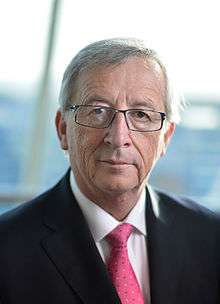
.jpg)

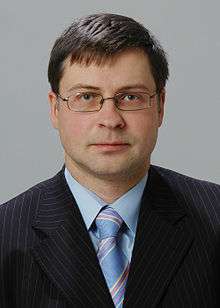


_(2).jpg)
.jpg)
